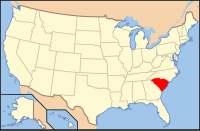Edgefield County, South Carolina
| Edgefield County, South Carolina | |
|---|---|
 Location in the U.S. state of South Carolina |
|
 South Carolina's location in the U.S. |
|
| Founded | 1785 |
| Seat | Edgefield |
| Largest city | Edgefield |
| Area | |
| • Total | 507 sq mi (1,313 km2) |
| • Land | 500 sq mi (1,295 km2) |
| • Water | 6.3 sq mi (16 km2), 1.2% |
| Population | |
| • (2010) | 26,985 |
| • Density | 54/sq mi (21/km²) |
| Congressional district | 3rd |
| Time zone | Eastern: UTC-5/-4 |
| Website | www |
Edgefield County is a county located on the western border of the U.S. state of South Carolina. As of the 2010 census, its population was 26,985. Its county seat is Edgefield.
Edgefield County has as part of its western border the Savannah River; across the river is Augusta, Georgia. Edgefield is part of the Augusta-Richmond County, GA-SC Metropolitan Statistical Area.
The origin of the name Edgefield is unclear; the South Carolina State Library's information on the county's history suggests that the name "is usually described as 'fanciful.'" There is a village named Edgefield in Norfolk, England.
Edgefield District was created in 1785, and it is bordered on the west by the Savannah River. It was formed from the southern section of the former Ninety-Six District when it was divided into smaller districts or counties by an act of the state legislature. Parts of the district were later used in the formation of other neighboring counties, specifically:
In his study of Edgefield County, South Carolina, Orville Vernon Burton classified white society as comprising the poor, the yeoman middle class, and the elite planters. A clear line demarcated the elite, but according to Burton, the line between poor and yeoman was never very distinct. Stephanie McCurry argues that yeomen were clearly distinguished from poor whites by their ownership of land (real property). Edgefield's yeomen farmers were "self-working farmers," distinct from the elite because they worked their land themselves alongside any slaves they owned. By owning large numbers of slaves, planters took on a managerial function and did not work in the fields.
...
Wikipedia
